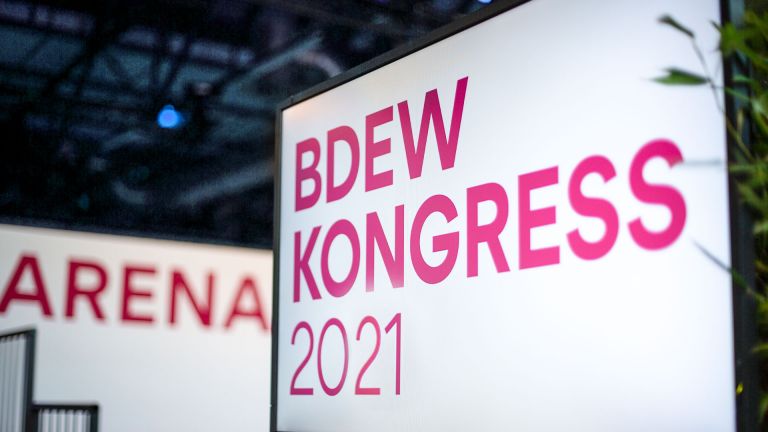“An efficient hydrogen market will give the energy transition the crucial push”


- A technology-open energy policy is vital to establish the market quickly
- Advances in Wintershall Dea’s own hydrogen projects
- Germany has to catch up: Denmark, Norway and the Netherlands are ahead in CCS
Germany is in the midst of an election campaign, but the major parties agree on one point: All of them are in favour of a hydrogen market. “It’s good that policymakers also acknowledge the future role of hydrogen. But we must not just look at Germany: We now have to establish a hydrogen market – in Germany, Europe and worldwide,” says Mario Mehren, CEO of Wintershall Dea, at the BDEW Congress in Berlin on September 15th. He adds that such a market is created by supply and demand. “We have a chicken and egg problem here: There is no market without hydrogen production, and the industry won’t switch to new technologies if there aren’t sufficient volumes.” Mehren is convinced that an efficient hydrogen market can give the energy transition the crucial push.
“Establishing a hydrogen market is an enormous project: The energy sector and industry face a transformation that will require huge investments. In the future hydrogen can replace coke in the steel industry, kerosene in aircrafts, heavy fuel oil in ships and diesel in trucks. Parts of the overall infrastructure also have to be converted. Reliable conditions are needed for these changes,” states Mehren. “For us to succeed in that, we require a technology-open approach that includes all forms of climate-friendly hydrogen production. As long as green hydrogen is not available in sufficient volumes and at attractive prices, we also need hydrogen from natural gas in order to establish the market quickly. It’s my conviction that green hydrogen will benefit from a mature market in the long term.”
Focus on climate-friendly hydrogen from natural gas
Wintershall Dea is driving the energy transition with blue and turquoise hydrogen obtained from natural gas. Together with VNG, the company is planning to build a plant for producing turquoise hydrogen. As part of that, the methane pyrolysis method used by the British start-up HiiROC, in which the two companies have invested, is intended to be used in 2023. Moreover, the company has been conducting research into methane pyrolysis in collaboration with the Karlsruhe Institute of Technology (KIT) for a number of years now. Solid carbon is obtained in this method of producing hydrogen and can then be used as a raw material in industry.
Germany should start a dialogue on carbon capture and storage (CCS)
Various international studies in recent months have shown that CCS (carbon capture and storage) is vital if we want to achieve our climate targets. The Intergovernmental Panel on Climate Change, for example, made it clear that the target for limiting global warming to 1.5°C can only be achieved using CCS. CCS enables unavoidable emissions from industry (the steel, chemicals or cement sector) to be reliably captured and stored long term.
“We in Germany must not simply spurn the possibilities CCS offers. Countries like Norway, Denmark and the Netherlands are already ahead in the field of CCS and have created the technical and statutory conditions for it,” says Mario Mehren in Berlin. “We should start an open, constructive and transparent dialogue on CCS in Germany: We need to focus on some hard questions, such as what are we going to do with the residual CO2 from heavy industry if it is not to escape into the atmosphere? How will we meet our climate targets, quickly and affordably, without safe, reliable offshore CCS. At Wintershall Dea we are ready to engage constructively and to contribute our knowledge and expertise.”
Wintershall Dea is a consortium partner in the CCS project Greensand in the Danish North Sea. In the planned pilot project phase, the consortium aims to demonstrate that CO2 can be stored in a cost-effective and environmentally-friendly way in the Nini West offshore reservoir. CCS has strong political backing in Denmark. The Danish parliament regards the technology as an indispensable method for achieving national emission targets. “The Greensand project could provide all the carbon storage capacities aimed for in Denmark’s climate programme,” states Wintershall Dea’s CTO Hugo Dijkgraaf. “Unavoidable emissions from industry can be stored safely in this CCS project. As a result, we’ll enable European industry to have a clean and successful future, while making an important contribution to protecting the climate.”
About Wintershall Dea
Wintershall Dea is Europe’s leading independent natural gas and oil company with more than 120 years of experience as an operator and project partner along the entire E&P value chain. The company with German roots and headquarters in Kassel and Hamburg explores for and produces gas and oil in 13 countries worldwide in an efficient and responsible manner. With activities in Europe, Russia, Latin America and the MENA region (Middle East & North Africa), Wintershall Dea has a global upstream portfolio and, with its participation in natural gas transport, is also active in the midstream business. More in our Annual Report.
As a European gas and oil company, we support the EU's 2050 carbon neutrality target. As our contribution we have set ourselves ambitious targets: We want to be net zero across our entire upstream operations – both operated and non- operated by 2030. This includes Scope 1 (direct) and Scope 2 (indirect) greenhouse gas emissions on an equity share basis. In addition Wintershall Dea will bring methane emissions intensity below 0.1 per cent by 2025 and maintain zero routine flaring of associated gas in its operations. The climate goals are to be achieved through portfolio optimization, emissions reduction through more energy efficiency, investments in nature-based compensation solutions and in future technologies such as hydrogen and CCS. You can find more about this in our Sustainability Report.
Wintershall Dea was formed from the merger of Wintershall Holding GmbH and DEA Deutsche Erdoel AG, in 2019. Today, the company employs around 2,500 people worldwide from over 60 nations.

